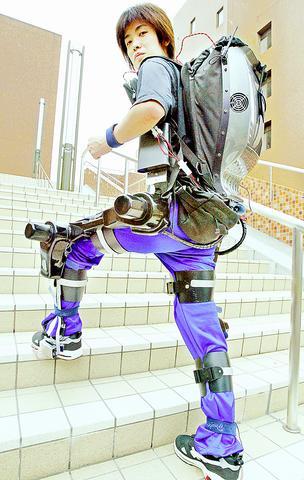Japanese companies are preparing for the commercial launch of a "robot suit" that helps aged or physically disabled people walk, get up the stairs or seat themselves to relax without a chair.
Trading house Mitsui and Co and some 30 other Tokyo firms plan to set up a joint-venture in April or May next year to market the powered suit developed by Yoshiyuki Sankai, professor and engineer at Tsukuba University, officials said yesterday.

PHOTO: AFP
"This is neither a robot in machine factories nor a one for amusement like a pet robot. This is a brand-new proposal projecting a future image of relations between people and robots," Sankai said.
"The suit practically supports people's life, focusing on the strong point of robots," Sankai said.
The powered suit, code-named HAL-3 (Hybrid Assistive Leg), consists of a computer and batteries in the backpack as well as four actuators attached around the knees and hip joints.
The motor-powered devices guide movement of the legs as the computer calculates the user's next motion by detecting faint electric signals from the muscle, the professor said.
With the equipment, the user can walk at a speed of 4km per hour with little physical exertion and avoid the jerky stop-go moves of ordinary robots.
As a first step, the new venture plans to lease or sell 10 prototypes next year, Sankai said.
A mid-term goal for the project is to sell some 100 suits a year at a price of ?1 million (US$8,440).
Sankai also noted that Japan's greying society was a key consideration behind the development of the suit.
"As the country is heading rapidly towards an ageing society, the demand for such a robotic support system will certainly grow," the professor said.
"Not only the elderly but also disabled people will be able to live comfortably, leaving heavy physical tasks to the suit," he said.

The combined effect of the monsoon, the outer rim of Typhoon Fengshen and a low-pressure system is expected to bring significant rainfall this week to various parts of the nation, the Central Weather Administration (CWA) said. The heaviest rain is expected to occur today and tomorrow, with torrential rain expected in Keelung’s north coast, Yilan and the mountainous regions of Taipei and New Taipei City, the CWA said. Rivers could rise rapidly, and residents should stay away from riverbanks and avoid going to the mountains or engaging in water activities, it said. Scattered showers are expected today in central and

COOPERATION: Taiwan is aligning closely with US strategic objectives on various matters, including China’s rare earths restrictions, the Ministry of Foreign Affairs said Taiwan could deal with China’s tightened export controls on rare earth metals by turning to “urban mining,” a researcher said yesterday. Rare earth metals, which are used in semiconductors and other electronic components, could be recovered from industrial or electronic waste to reduce reliance on imports, National Cheng Kung University Department of Resources Engineering professor Lee Cheng-han (李政翰) said. Despite their name, rare earth elements are not actually rare — their abundance in the Earth’s crust is relatively high, but they are dispersed, making extraction and refining energy-intensive and environmentally damaging, he said, adding that many countries have opted to

FORCED LABOR: A US court listed three Taiwanese and nine firms based in Taiwan in its indictment, with eight of the companies registered at the same address Nine companies registered in Taiwan, as well as three Taiwanese, on Tuesday were named by the US Department of the Treasury’s Office of Foreign Assets Control (OFAC) as Specially Designated Nationals (SDNs) as a result of a US federal court indictment. The indictment unsealed at the federal court in Brooklyn, New York, said that Chen Zhi (陳志), a dual Cambodian-British national, is being indicted for fraud conspiracy, money laundering and overseeing Prince Holding Group’s forced-labor scam camps in Cambodia. At its peak, the company allegedly made US$30 million per day, court documents showed. The US government has seized Chen’s noncustodial wallet, which contains

SUPPLY CHAIN: Taiwan’s advantages in the drone industry include rapid production capacity that is independent of Chinese-made parts, the economic ministry said The Executive Yuan yesterday approved plans to invest NT$44.2 billion (US$1.44 billion) into domestic production of uncrewed aerial vehicles over the next six years, bringing Taiwan’s output value to more than NT$40 billion by 2030 and making the nation Asia’s democratic hub for the drone supply chain. The proposed budget has NT$33.8 billion in new allocations and NT$10.43 billion in existing funds, the Ministry of Economic Affairs said. Under the new development program, the public sector would purchase nearly 100,000 drones, of which 50,898 would be for civil and government use, while 48,750 would be for national defense, it said. The Ministry of